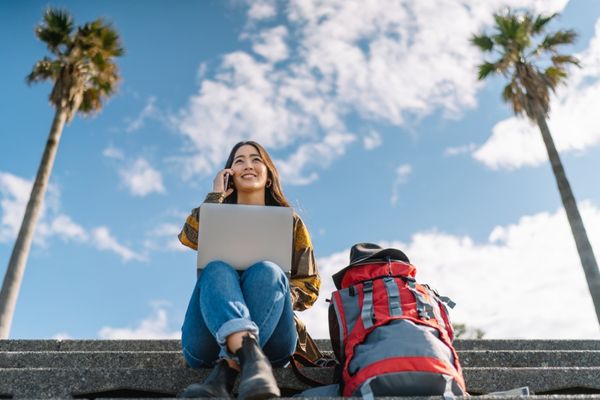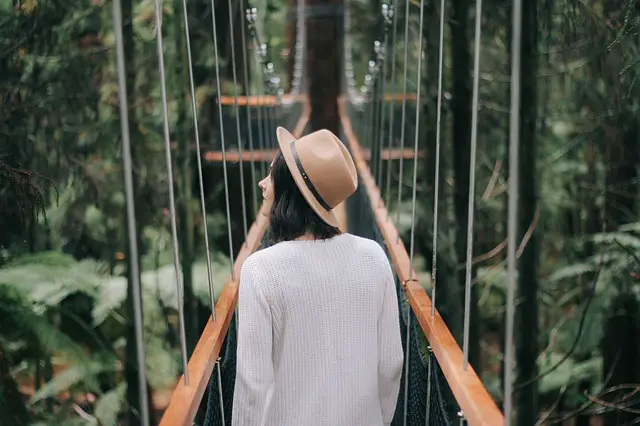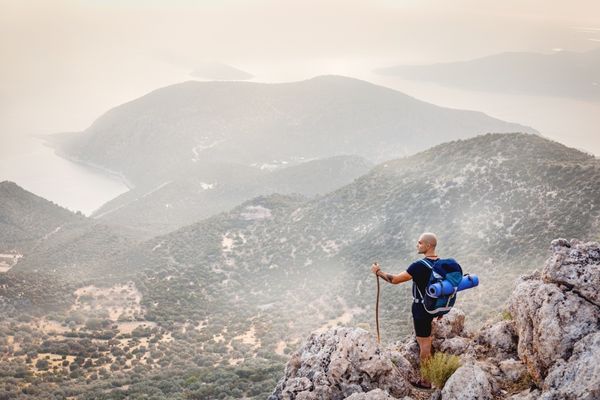
Many people say traveling teaches you a lot of lessons. But I’ll go beyond it and say traveling alone assures you plenty of learning experiences. Whether it’s embarrassing or adopting a new habit to enhance your knowledge, there’s nothing quite the same as traveling alone.
It’s not unusual or uncommon to feel nervous or be scared to pursue solo travel all the time. That’s because we visit new places, uncertain of expectations despite our resourcefulness in research and preparation.
When you travel with a companion or be part of a group, you rely on each other; when you travel alone, you have to make the decision — or take the initiative, such as asking guidance from a stranger or deciding on which way to go — because nobody else will do it for you.
However, being a solo traveler presents a unique set of advantages, not to mention an enormous opportunity to learn.
Read on to learn more.
Table of Contents
You are in control and make decisions.
Despite that huge stack of responsibilities, traveling alone also means you are virtually in control when it comes to decisions to make. That’s because being alone also means you can follow your desires.

How long should I stay in this city? Do I join a group tour or rely on guidebooks or mobile apps to explore attractions? Should I take public transport, hire a private ride or take a walk? Should I go scuba diving, surfing, or sunbathing with cocktail drinks? Should I eat local specialties or stay with my preferred comfort food? I feel too lazy to wake up, so I can stay in bed without the pressure to take the hotel’s early breakfast buffet.
If you haven’t observed it, the only person you please is yourself (without feeling guilty) and no one else.
Who doesn’t want such a level of freedom?
Challenges build up your self-confidence.
Traveling solo can help build up your self-confidence. Just like someone battling stage fright on stage, being on a trip on your own is like training yourself to overcome obstacles — being prepared for whatever happens.
What if the flight is canceled or you got bumped off? What if your credit card doesn’t work? What if you get lost in a place where nobody speaks a language you know?
Staying at home and doing the usual thing is within your comfort zone and hardly poses any challenge. But if you climb the BridgeClimb in Sydney, ski for the first time in the Swiss Alps, or bungee jump at Macau Tower, that’s a challenge that could be a life-changing experience.

Sometimes there are challenges during your holiday that require you to overcome them. Conquering these challenges boost your self-confidence, a personal characteristic you can apply in other aspects of life such as in a job interview, facing difficult clients at work, or bargaining in a flea market.
You’re likely to make more new friends.
Traveling with friends or family, we tend to stick together with them, leaving less opportunity to interact with others except for airline ground check-in staff, hotel concierges, or tour guides.
But when you are alone, suddenly, there are plenty of chances to engage with others. It can be someone seated next to you on the plane, a fellow participant in a tour group, fellow guests in backpacker accommodation, or locals you meet along the way. You suddenly discover you’ve become more chatty and friendly than usual.
When traveling by yourself, you suddenly find yourself more inclined to interact with people whom you wouldn’t have approached if you are in the company of friends or family. They could be fellow travelers or locals introducing their culture through languages like learning language basics, local food, or traditions. Such an immersive experience helps you understand and appreciate your journey.
The friends you meet can sometimes extend beyond the duration of your vacation, creating a more comprehensive network of opportunities in the process.
You gain new perspectives.
By observing your surroundings alone more than talking (or arguing) with your travel companions, you allow yourself to reflect on your goals and targets, career progression, planning for a family, and life in general. Seeing how people go about their daily lives, you get a sense of appreciation and contentment. Along the same lines, you get a deeper understanding of what you want and aim to be, thanks to the ample time to reflect on yourself more intimately.

Upon your return from the trip, you might realize you’ve been enslaved by your corporate life and wish to simplify it. You may be spending more time working confined in the office and now desire a career that interacts more with people. You might also want to change how you run your life — wake up earlier, incorporate a healthier diet, or plan on working or migrating elsewhere for a change in scenery.
You can save more money.
It’s a given that traveling is an expensive habit, regardless if you’re going for a no-frills backpacking route or that luxury lifestyle. If saving some cash is what you aim for while enjoying your journey, the presence of your travel companions could pose as a deal-breaker.
Your spouse wants to try that fancy restaurant and disagrees with your cheaper street food option. Despite your advice, your friend wants to try that tourist trap attraction, dragging you to spending in the process. Your partner wants to book that posh hotel so she can brag about it on Instagram.
Your travel companions are not available to travel during the cheapest months, even if it fits your plans. These examples are just some possible instances that force you to spend more and defeat your objective to save. Traveling alone could eliminate these issues.
That’s because when you’re alone, you can choose to take the cheapest alternatives in food choice, means of local transport, booking flights or selection of hotels (or prefer couch-surfing) if you wish to.
You improve your creativity
Traveling alone can stimulate creativity by exposing you to new environments, cultures, and perspectives. This can inspire you to think outside the box and approach problems in new and innovative ways.
One example of how traveling alone can increase creativity is when a solo traveler is exposed to new and unfamiliar environments, cultures, and perspectives. This can inspire them to approach problems or challenges differently, leading to creative solutions they may not have considered before. Additionally, when traveling alone, a person is forced to rely on themselves and their creativity to navigate new situations, boosting their confidence and inspiring them to think outside the box.
Conclusion
There are indeed plenty of advantages a solo traveler can enjoy. Besides those listed above, such travelers gain more knowledge and confidence and enjoy the journey better with fewer hassles and no opposing ideas. Yes, you’ll make mistakes, but you the traveler, learn from them and will continue to dictate the outcome, do things, and craft your adventure at your convenience.







